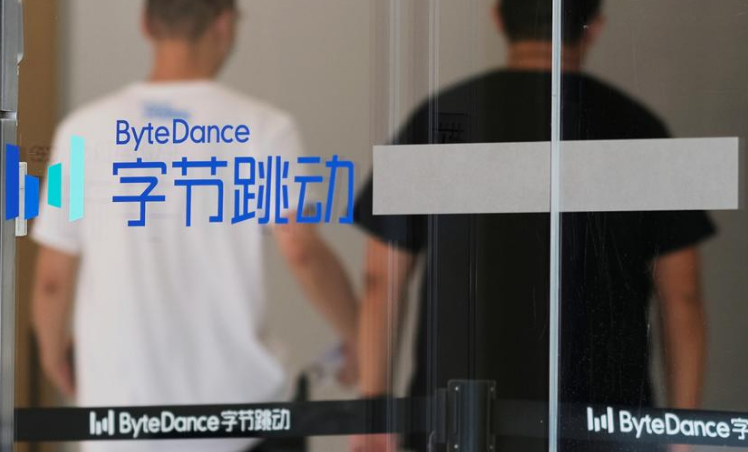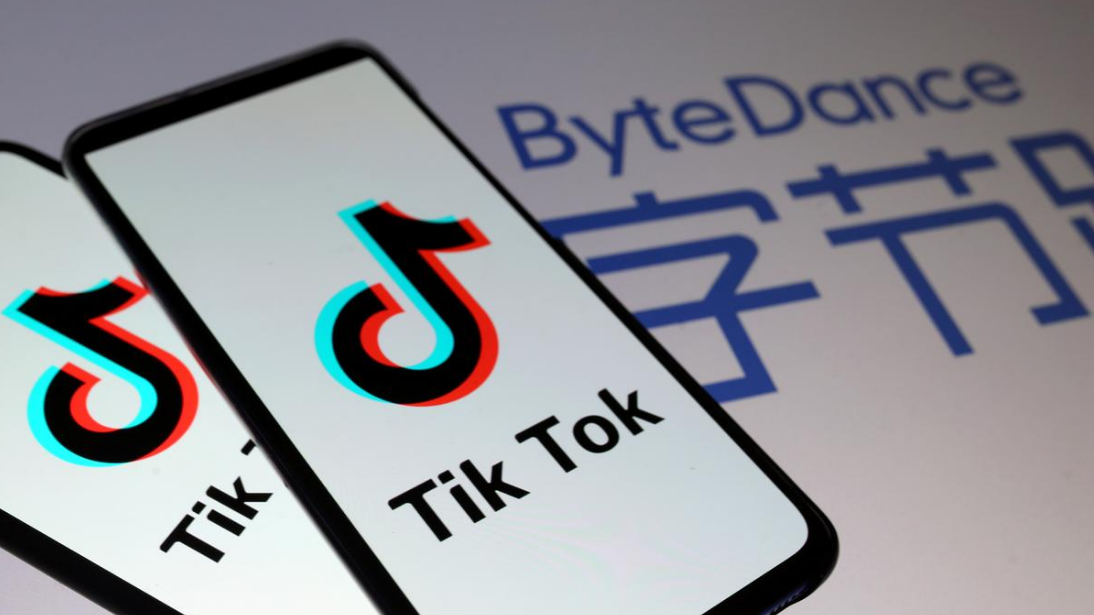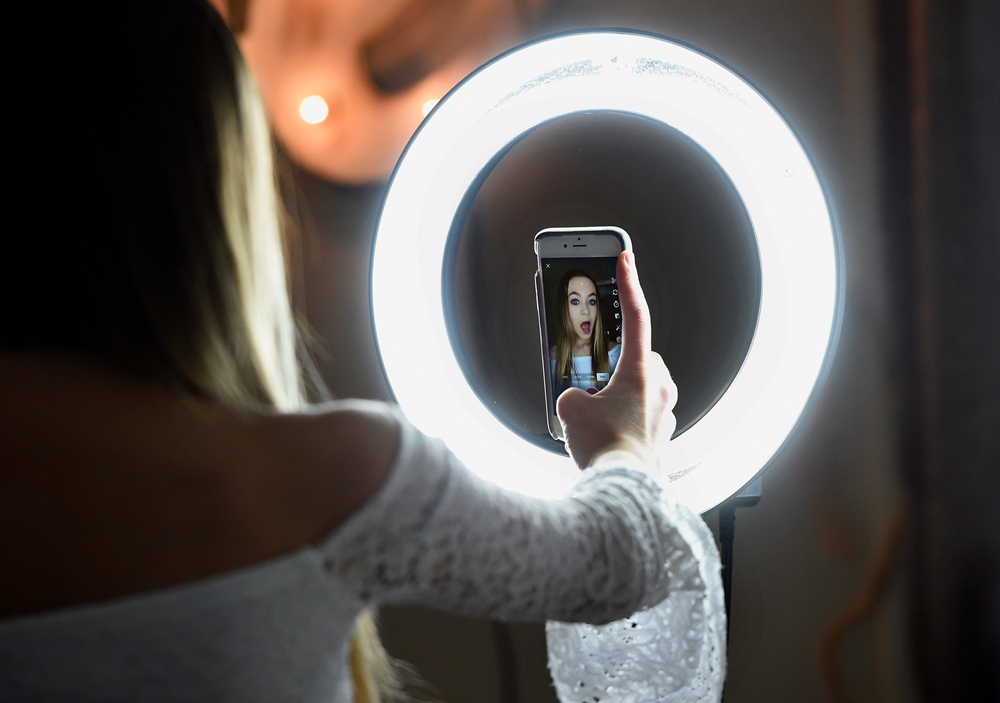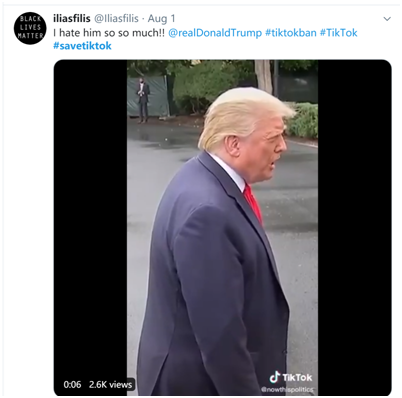Last Friday, U.S. President Donald Trump announced that he would invoke emergency powers to ban TikTok – the hottest social media app in the U.S. currently, and known for being a platform where Gen. Z post popular online memes and lip-sync videos. The Trump administration said the app needs to be banned because its Chinese parent company ByteDance is in a position to surveil and steal American users' personal data.
President Trump has since flip-flopped on the threat and given the Chinese internet giant 45 days to negotiate a sale of the app to Microsoft, or face a shutdown of its U.S. operation, according to Reuters.
"ByteDance has been determined to become a global company. Throughout this endeavor, we face unimaginable difficulties, including heightened geopolitical environment, a clash between different cultures as well as plagiarism and smearing from our competitor Facebook," ByteDance said in a statement on Sunday.

People walk past a logo of ByteDance, the China-based company which owns the short video app TikTok, at its office in Beijing, July 7, 2020. /Reuters
People walk past a logo of ByteDance, the China-based company which owns the short video app TikTok, at its office in Beijing, July 7, 2020. /Reuters
'Plundering in broad daylight'
The announcement came at a time when President Trump is becoming desperate to divert attention from mounting domestic issues, such as the racial divide, increasing wealth gap, and failure to contain outbreak of COVID-19 as the 2020 presidential election approaches, according to some experts. In the past weeks, the Trump administration has pursued escalating tensions with China by closing down the country's diplomatic mission in Houston.
"It's clear the U.S. action toward TikTok goes against the basic free-market principles, although very similar to treatments received by other Chinese companies such as Huawei. The decision taken by President Trump is a blow to the U.S. image that it worked hard to project over the years," Wang Yong, director of the Center for American Studies at Peking University, told CGTN.
The move is likely pushed by diehard China hawks within Trump's inner circle, including U.S. Secretary of State Mike Pompeo and White House trade adviser Peter Navarro, who's famous for making sensational but false claims dedicated to defaming China.
In his latest book "Death by China," the White House advisor was exposed of repeatedly quoting from a made-up expert named "Ron Vara" – an anagram of Navarro – and delivered musings such as "You've got to be nuts to eat Chinese food" and "Only the Chinese can turn a leather sofa into an acid bath."
During an interview with Fox News on Sunday, State Secretary Pompeo suggested more Chinese companies could be subjected to ban in the U.S.
"All the facts show that Washington's persecution of TikTok has nothing to do with 'national security,' but rather using it as an excuse to ransack Chinese companies' investment in the U.S.," Lv Xiang, a research fellow at the Chinese Academy of Social Sciences in Beijing, told CGTN.
"This plundering in broad daylight not only will damage the sizable interest of Chinese companies, but also the trust of international investors in the integrity of the U.S. investment climate."

TikTok logos are seen on smartphones in front of a displayed ByteDance logo in this illustration. /Reuters
TikTok logos are seen on smartphones in front of a displayed ByteDance logo in this illustration. /Reuters
'New Cold War' shadow
As the first foreign internet company to have won over Americans and challenge the long-standing tech dominance of Silicon Valley, TikTok has stoked fears of the U.S. establishment.
At a glance, few would associate a light-hearted app embraced by American teenagers with China, let alone geopolitics. The repeated efforts by ByteDance to Americanize TikTok, including the recent hiring of former Disney executive Kevin Mayer as its CEO, all signaled an eagerness to cooperate with its American counterpart.
Yet in recent years, Chinese tech leaders have had to learn the hard way that no amount of compromise could shield their companies from the "new Cold War" Washington has waged against China.
Commentators from both countries have pointed out that what's happening to TikTok has laid bare American protectionism, hypocrisy, and arguably racism and xenophobia.
"No matter how hard TikTok tries to be a great American company, it cannot escape the fate of being targeted by the White House due to its Chinese origin," said Zhao Minghao, a senior research fellow at the Charhar Institute and an adjunct fellow at the Chongyang Institute for Financial Studies at the Renmin University of China.
Zhao noted that to this day, all claims from U.S. officials about TikTok's connections with the Chinese government are assumptions without evidence, and all attempts by the company to address the U.S. concerns have been ignored.
"What this is saying, clearly, is that any Chinese success is going to be viewed as a game of 'zero-sum' by Washington. Whether it is Huawei or ByteDance, private enterprises from China are facing an unprecedented crackdown from the U.S.," Zhao said. "In its 'new Cold War' against China, American racism and McCarthyism have joined forces."

Many young Americans have become full-time influencers on TikTok. /AP
Many young Americans have become full-time influencers on TikTok. /AP
Creator community disrupted
More than a steady supply of laughs and giggles, TikTok has successfully adapted its platform to the global youth culture and the digital economy, which is witnessing a defining moment during the COVID-19 pandemic.
Like other platforms before it, a growing number of people have built careers, personal brands and grown to depend on the app for income, after spending years amassing a following. Some even dropped out of college to pursue a full-time career as an influencer.
The company has recently announced a 1-billion U.S. dollar creator fund to support those in the U.S. who are earning a living through the platform.
Unsurprisingly, news of a U.S. ban sent shockwaves through the influencer community over the weekend, with many revolting against the Trump administration by calling on followers to retaliate against the president's 2020 campaign app and leave negative reviews and poor ratings for his businesses.

TikTok users react to Trump's ban on the app. /Twitter
TikTok users react to Trump's ban on the app. /Twitter
"It has put food on our table," content creator Hootie Hurley told the New York Times. The 21-year-old, who has more than 1.1 million followers on TikTok, said a ban on the app would be "devastating" for him.
"TikTok has been such a big part of everyone's quarantine and helping everyone get through this pandemic," he said.
"If TikTok did shut down, it would be like losing a bunch of really close friends I made, losing all the progress and work I did to get a big following," said Ashleigh Hunniford, who has more than 400,000 followers.

TikTok users react to Trump's ban on the app. /Twitter
TikTok users react to Trump's ban on the app. /Twitter
For those users unfamiliar with the U.S.-China feud, the Trump administration's contempt for TikTok has been seen as political in other ways, such as a response to activism surrounding anti-racism and climate change and videos mocking Trump. Those old enough to vote in the coming election have taken to Twitter to send a message to their government under the hashtag #savetiktok.
"For many kids, politics feel very distant," 18-year-old TikTok star Eitan Bernath told the New York Times. "This might be the first time it hits home for a lot of kids."